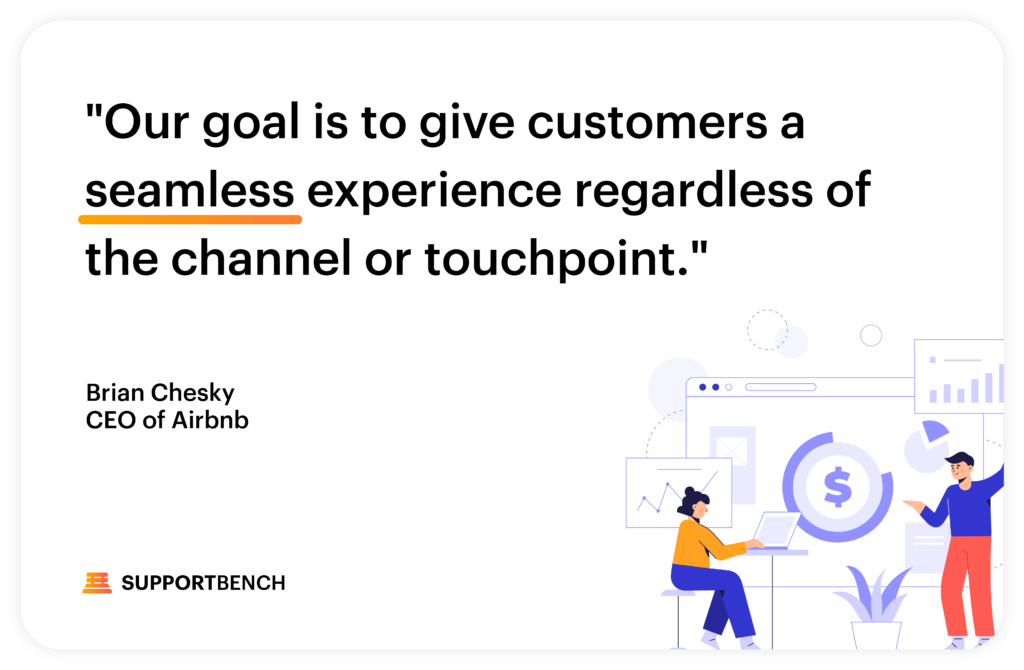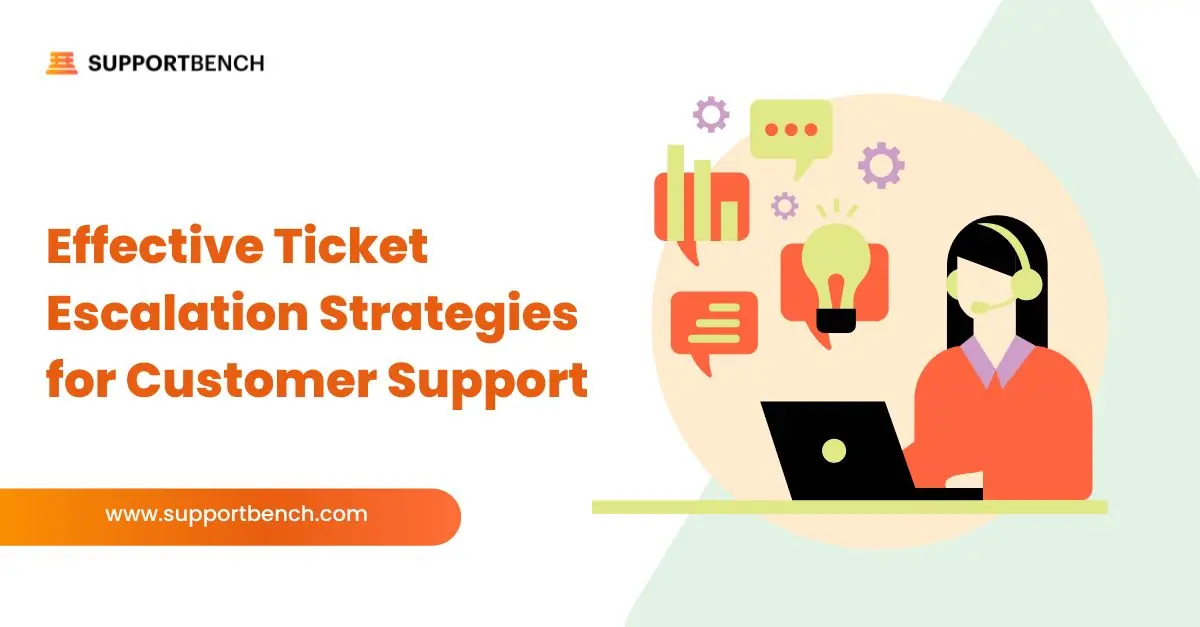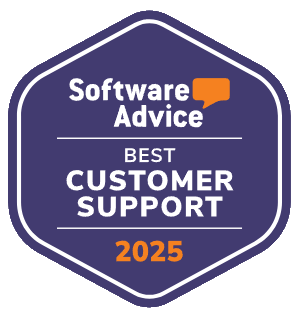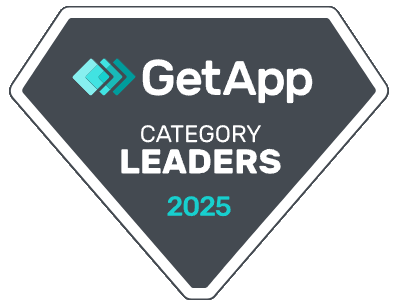Gone are the days when support was seen merely as a problem-solving function; today, support teams are emerging as the champions of customer experience and even as strategic business partners. A McKinsey study reveals that 70% of buying experiences are based on how customers feel they are being treated, emphasizing the importance of exceptional support in shaping customer perceptions and loyalty.
“Our goal is to give customers a seamless experience regardless of the channel or touchpoint.” – Brian Chesky, CEO of Airbnb
Although Freshdesk has been a significant player in the customer support software space, its capabilities and functionality may not be ideally suited to today’s complex digital market. When we delve into the intricate demands of B2B enterprise operations, we find that a more robust, integrated, and forward-thinking solution like Supportbench offers undeniable advantages. So, let’s get right into why a B2B company using Freshdesk in today’s rapidly changing market might find itself at a disadvantage compared to one leveraging Supportbench:

1. Tailored Dynamic SLAs
I can’t speak enough about the value of dynamic and customizable SLA’s. In the B2B, every client interaction has high stakes. Missed SLAs are not just about unsatisfied customers; they can lead to broken contracts and substantial financial penalties. We all know, some clients and situations will have more strategic importance than others, requiring differentiated SLAs based on that particular instance. Freshdesk does allow for basic prioritizations. It sets up your SLAs based on predetermined conditions. But with Freshdesk, the adaptability in real-time scenarios is limited. However, the level of client-centric adjustments in platforms designed for B2B operations are far more intricate, ensuring that strategic clients always receive exceptional service levels.
The truly dynamic nature and real-time adaptability of Supportbench’s SLAs are unparalleled. Supportbench’s ability to provide dynamic SLAs, tailored based on the urgency and intricacies of specific cases, offers an unprecedented advantage. For example, when a renewal is due, Supportbench ensures tighter SLAs, enhancing the customer experience.
2. Comprehensive AI Integration
In the age of data, AI isn’t just a perk – it’s a necessity. Emerging trends reveal that proactive support, powered by AI, is a game-changer in improving customer satisfaction. Supportbench’s integration of AI-driven summaries, knowledge base article creation, sentiment analysis, and emotional scoring brings an edge in proactive customer support. Freshdesk does have AI capabilities, but they’re highly limited; static even. The depth and real-time synchronization of Freshdesk’s AI integrations might not be as seamless as required for intricate B2B operations. Effective SLA management in the B2B domain often necessitates a deeper link between the support platform and other enterprise systems.
Conversely, Supportbench’s deep AI integration, including the utilization of ChatGPT, allows for a more nuanced understanding of customer needs and foresights, setting the latter apart. When AI is correctly used in a support platform, only then do you have proactive support where your system is offering solutions long before problems arise!
And of course, although the integration and implement of AI in your support department is vital, it’s your team that will take the platform to the next level. If they’re given a premium platform and trained and encouraged regularly, your organization will benefit at every level.
3. 360-Degree Customer Overviews
The B2B world thrives on deep, long-term relationships. Understanding a client’s history, needs, and challenges are crucial. Supportbench’s 360-degree customer overviews and reporting give support teams a holistic understanding of each client, enabling them to provide more personalized and efficient support. While Freshdesk offers customer insights, the depth and integration offered by Supportbench make a considerable difference in enhancing customer relationships.
4. Enhanced Collaboration and Synchronization with CRMs
As the famous quote from Helen Keller goes, “Alone we can do so little; together we can do so much.” Enhancing team collaboration can result in a more effective and efficient support process.
The synchronization capabilities with CRMs, especially Salesforce, in Supportbench are extensive. It doesn’t just pull in ticket data but can synchronize any data point, giving agents a comprehensive view of licensing information, past interactions, and even enabling workflows based on customer data. While Freshdesk does offer CRM integration, the depth of synchronization and workflow automation in Supportbench is more advanced.
5. A Truly Unified Experience
Gartner predicts that by 2022, 85% of customer interactions will start with an AI, emphasizing the growing importance of integrated support channels. The ideal is a platform where chats, emails, calls, and other support mediums converge, ensuring a unified customer experience.
Supportbench offers an all-in-one platform experience, from email management, chatbots, and a fully customizable customer portal to advanced administration and reporting features. Freshdesk, while comprehensive, might require additional integrations or plugins to match the same level of unification, potentially leading to fragmentation. And isn’t it the worst when you’re toggling between 10 different tools to accomplish simple tasks?!
6. Custom Data Management with Data Tables
In B2B, every client might have unique requirements and data points. Supportbench’s Data Tables allows teams to add custom data to customer records. This flexibility ensures that the support team has all the nuanced information they might need, from training records to infrastructure details. Such granular customization might not be as seamless in Freshdesk. Keep in mind, Freshdesk was designed a while back, with a broader target audience in mind and might not be able to provide the level of scalability that a dedicated B2B-focused solution like Supportbench offers, which is built from the ground up to handle high-scale enterprise needs.
For more in dept data analytics, you can use Supportbench’s customizable dashboards and KPI scorecards to gain in-depth insights into customer behaviors and preferences. And of course, you can use insights derived from data analytics to identify areas where your support team can improve and tailor their training programs accordingly.
7. KCS Knowledge Base and Autonomous Operations
A recent study by TSIA found that companies adopting KCS report a 50% or greater improvement in key performance indicators. By creating a dynamic, constantly evolving knowledge base, support teams can offer instant solutions, reduce response times, and enhance customer self-service.
Supportbench’s KCS knowledge base goes beyond just providing solutions. It is a dynamic, constantly evolving repository that becomes more refined with every interaction. Paired with the platform’s design to reduce IT dependency, it truly empowers customer support teams to be autonomous and proactive. Freshdesk does offer a knowledge base, the depth, flexibility, and seamlessness required for intricate B2B integrations might be lacking. In comparison, the continuous evolution and self-sufficiency promoted by Supportbench give it a distinct edge.
8. Custom Surveys and Health Scoring
Feedback is gold in customer support. Supportbench’s custom surveys, including NPS and CES, combined with its customer health scoring based on actual interactions, provides invaluable insights into customer satisfaction and areas of improvement. While Freshdesk has feedback mechanisms, the depth of analysis and integration with other features makes Supportbench’s approach more comprehensive.
Concluding Thoughts
By integrating the latest trends, from AI-driven support to knowledge-centered strategies, Supportbench is ensuring that support teams are not just problem solvers but critical contributors to organizational success. As we embrace these emerging paradigms, one thing is clear: with platforms like Supportbench leading the way, the future of support is brighter than ever.
And while Freshdesk is undeniably a robust customer support platform, when it comes to B2B enterprise needs, Supportbench brings to the table a combination of features and integrations that are hard to match. By offering a comprehensive, deeply integrated, and forward-thinking platform, Supportbench ensures B2B organizations are not just meeting their current needs but are also prepared for future challenges. In the high-stakes world of B2B customer support, every advantage counts, and Supportbench seems poised to offer just that.















